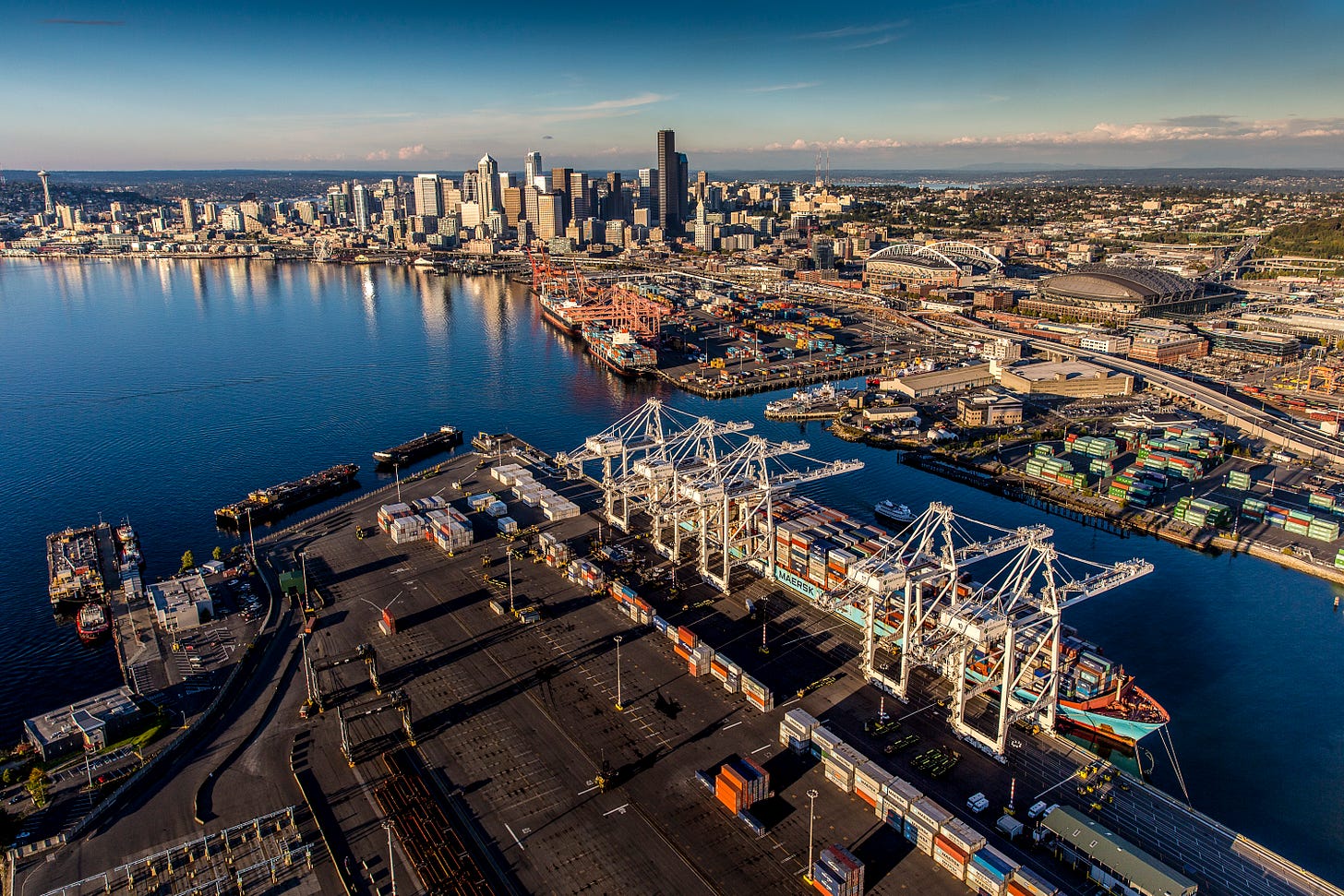06/20/2025: ILWU and Machinists Continue to Fight Over Work In the Port of Seattle
The 9th Circuit reverses the Board's decision against ILWU.
International Longshore and Warehouse Union v. NLRB, 23-632 (9th Circuit)
This case arises from a jurisdictional dispute between two unions—the International Longshore and Warehouse Union (ILWU) and the International Association of Machinists and Aerospace Workers (IAM)—both claiming contractual rights to perform maintenance work for SSA Terminals at Terminal 5 in the Port of Seattle.
SSA Terminals, a member of the Pacific Maritime Association (PMA), was bound by the Pacific Coast Longshore Contract Document (PCLCD) with ILWU, which required assigning certain maintenance work to ILWU-represented mechanics. However, SSA also had a separate collective bargaining agreement with IAM, guaranteeing IAM-represented mechanics the right to perform maintenance work at Terminal 5. When IAM threatened "economic action" after SSA initially assigned the work to ILWU mechanics, SSA turned to the National Labor Relations Board (NLRB) for resolution.
The NLRB invoked Section 10(k) of the National Labor Relations Act (NLRA) to resolve the jurisdictional dispute and awarded the work to IAM-represented mechanics. ILWU refused to accept this decision and pursued a grievance under the PCLCD seeking the value of the work assigned to IAM. An arbitrator found in ILWU's favor, effectively nullifying the NLRB's determination by requiring SSA to either reassign the work to ILWU or pay twice for the same work.
SSA then filed an unfair labor practice charge against ILWU, alleging that ILWU violated Section 8(b)(4)(D) of the NLRA by pursuing the grievance to coerce SSA into reassigning the work. ILWU defended itself by invoking the "work-preservation defense," which protects "primary" union activity aimed at preserving work within the confines of the employer-employee relationship.
The NLRB rejected ILWU's defense, holding that the work-preservation defense is unavailable in pure jurisdictional disputes where multiple unions have valid contractual entitlements to the disputed work. The NLRB ordered ILWU to cease and desist from pursuing the maintenance work at Terminal 5.
The Ninth Circuit, in an opinion by Judge Miller, held that the NLRB's position was foreclosed by the court's earlier decision in Kinder Morgan, which established that a valid work-preservation objective provides a complete defense against alleged violations of Section 8(b)(4)(D). Following Kinder Morgan, the court concluded that a union charged with an unfair labor practice under Section 8(b)(4)(D) may raise a work-preservation defense even when not alleged to have engaged in illegal secondary activity.
The court rejected the NLRB's argument that Kinder Morgan was distinguishable because it involved allegations of secondary activity in addition to the jurisdictional dispute. The court emphasized that Kinder Morgan explicitly held that the work-preservation defense applies to Section 8(b)(4)(D) violations separate from any secondary activity allegations.
The court also dismissed the NLRB's contention that its interpretation of Kinder Morgan conflicted with Recon, noting that Recon did not address whether a union in a genuine jurisdictional dispute can rely on the work-preservation defense to avoid liability for conduct contravening an adverse Section 10(k) award.
Accordingly, the court granted the petitions for review filed by ILWU and PMA, denied IAM's petition for review and the NLRB's cross-petition for enforcement, vacated the NLRB's order, and remanded the case for the NLRB to evaluate the merits of the work-preservation defense.
In a concurring opinion, Judge Miller expressed his view that Kinder Morgan was wrongly decided. He argued that applying the work-preservation defense to Section 8(b)(4)(D) cases undermines the jurisdictional dispute-resolution scheme enacted by Congress, creates a circuit conflict with the D.C. Circuit's decision in Sea-Land, and renders Section 10(k) work awards illusory by removing unions' incentives to comply with them.
Significant Cases Cited
International Longshore and Warehouse Union v. NLRB (Kinder Morgan), 978 F.3d 625 (9th Cir. 2020): Held that a valid work-preservation objective provides a complete defense against alleged violations of Section 8(b)(4)(D).
NLRB v. International Longshoremen's Ass'n (ILA), 447 U.S. 490 (1980): Established the two-part test for the work-preservation defense in the context of secondary boycott allegations.
National Woodwork Mfrs. Ass'n v. NLRB, 386 U.S. 612 (1967): Distinguished between permissible primary union activity and impermissible secondary union activity under the NLRA.
Recon Refractory & Const. Inc. v. NLRB, 424 F.3d 980 (9th Cir. 2005): Addressed when a dispute qualifies as a work-preservation dispute rather than a jurisdictional dispute.
International Longshoremen's & Warehousemen's Union v. NLRB (Sea-Land), 884 F.2d 1407 (D.C. Cir. 1989): Held that the work-preservation defense does not immunize conduct charged under Section 8(b)(4)(D), creating a circuit split with the Ninth Circuit's position.

